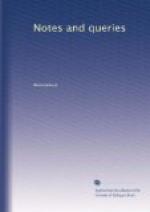John Bruce.
* * * * *
HALLAMS middle Ages—alleged ignorance of the clergy.
Sir,—When reading Hallam’s History of the Middle Ages a short time ago I was startled by the following passage which occurs amongst other evidences of the ignorance of the clergy during the period subsequent to the dissolution of the Roman Empire.
“Not one priest in a
thousand in Spain about the age of
Charlemagne, could address
a common letter of salutation to
another.”—Hallam’s
Middle Ages, vol. iii. p. 332.
And for this statement he refers to Mabillon, De Re Diplomatica, p. 52.
On referring to Mabillon, I find that the passage runs as follows:—
“Christiani posthabitis scripturis sanctis, earumque interpretibus, Arabum Chaldaeorumque libris evolvendis incumbentes, legem suam nesciebant, et linguam propriam non advertebant latinam, ita ut ex omni Christi collegio vix inveniretur unus in milleno hominum genere, qui salutatorias fratri posset rationabiliter dirigere litteras.”
So that although Mabillon says that scarce one in a thousand could address a Latin letter to another, yet he by no means says that it was on account of their general ignorance, but because they were addicting themselves to other branches of learning. They were devoting all their energies to Arabic and Chaldaean science, and in their pursuit of it neglected other literature. A similar remark might be made of respecting many distinguished members of the University to which I belong; yet who would feel himself justified in inferring thence that Cambridge was sunk in ignorance?
CANTAB.
* * * * *




